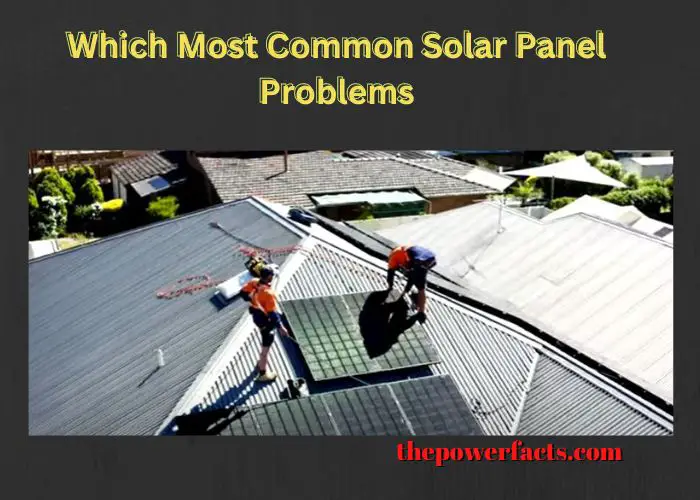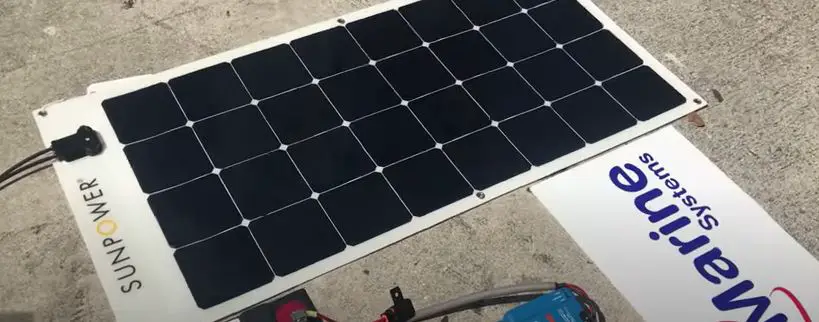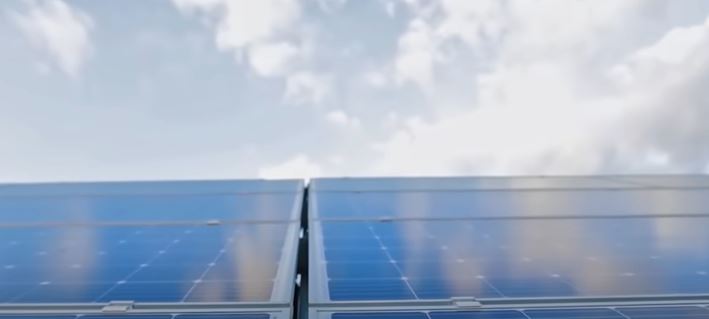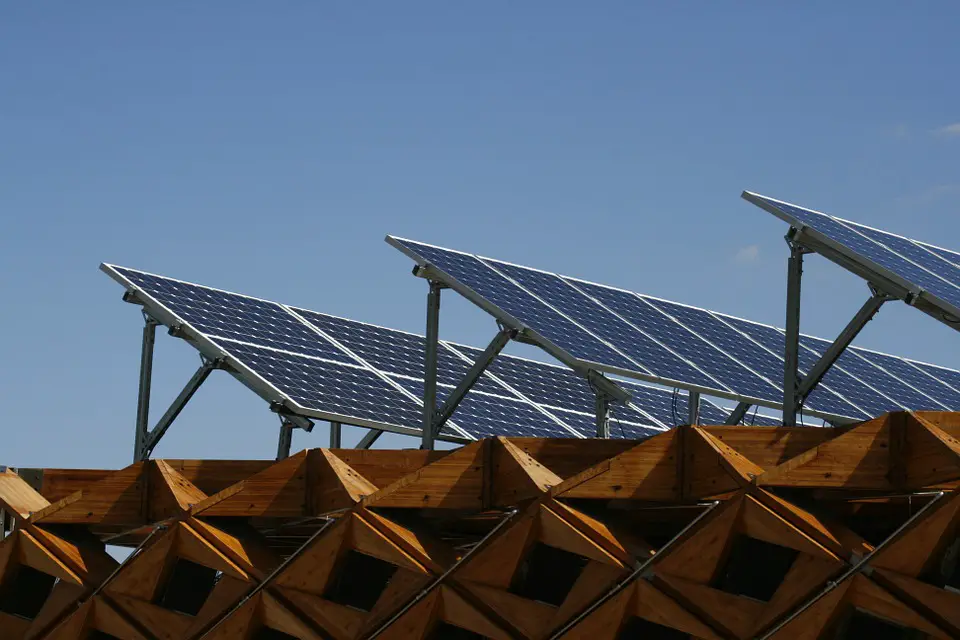There are a few common problems that can occur with solar panels. The most common problem is that the panels can become dirty and covered in debris, which will reduce their efficiency. Another common problem is that the panels can be damaged by hail or high winds.

If the panels are not properly installed, they can also experience leaks and water damage.
There are a few most common solar panel problems that you may encounter. You need to choose the best side that receives the most direct sunlight. The first is that the panels are not getting enough sunlight. This can be due to a number of factors, such as trees or buildings blocking the sun, or simply because the panels are not positioned correctly.
The second problem is that the panels are not generating enough power. This could be because they are not receiving enough sunlight, or because they are not efficient enough. The third problem is that the panels are not lasting as long as they should.
This could be due to weather damage, or simply because they were not made with high quality materials. If you find yourself having one of these problems, it is important to contact a professional solar panel company to help you troubleshoot and fix the issue. They will be able to determine what the problem is and provide you with a solution.
Solar Panel Warranty Problems
If you’re considering solar panels for your home, it’s important to understand the warranty coverage that’s available. Unfortunately, solar panel warranties can be complicated and difficult to understand. In some cases, they may not cover the problems you’re experiencing.
Most solar panel manufacturers offer a warranty that covers defects in materials and workmanship. However, these warranties typically only last for 10-25 years. And, they often have strict conditions that must be met in order for the warranty to be valid.
For example, some require proof of proper installation and maintenance. Others won’t cover damage caused by weather or other external factors.
It’s also important to note that many solar panel warranties only cover the panel itself – not the entire system.
So, if something goes wrong with one of the other components (like the inverter), you may have to pay for repairs or replacement out of pocket.
If you’re having problems with your solar panels, make sure to check your manufacturer’s warranty first. If it’s still valid, contact them to see if they’ll cover the cost of repairs or replacement.
How to Reset Solar Panels?

Are your solar panels not working as efficiently as they used to? Many people think that solar panels don’t work when it’s cloudy or raining. It may be time for a reset. Here’s how:
Check the Manufacturer’s Instructions
Some solar panels come with a reset button, while others may need to be disconnected and reconnected from the power source.
Clean the Panels
Dust, dirt, and debris can build up on solar panels and prevent them from absorbing sunlight properly. Use a soft cloth or brush to remove any buildup.
Check for Damage
If your solar panels are cracked or damaged, they will need to be replaced. Contact a professional if you are unsure of how to do this yourself.
Adjust the Angle of the Panels
Solar panels should be positioned so that they are facing directly into the sun . If they are not, they will not be able to absorb sunlight as effectively . Check the manufacturer’s instructions to see what angle is best for your particular model of solar panel .
What Happens If One Solar Panel Fails?
If you have a solar panel system with multiple panels, then one panel going out shouldn’t be a big deal. The other panels will make up for the loss and you’ll still be getting power from the sun. However, if your only source of power is from one solar panel, then you’re in trouble.
If that one panel fails, you’ll have no power at all.
Solar Panel Problems And Solutions
Solar panels are an increasingly popular way to generate electricity, but they can also be a source of problems. The most common solar panel problems include:
1. Dirty or Damaged Panels
2. Broken or Loose Connections
3. Incorrect Installation
4. Poorly Made Panels
Fortunately, most of these problems are relatively easy to fix. Read on for more details about each problem and what you can do to solve it.
Dirty or Damaged Panels
Over time, dirt and debris can build up on your solar panels, reducing their effectiveness. This is especially true if you live in an area with a lot of dust or pollen. To clean your panels, simply use a soft brush or cloth to wipe them down every few months.
If the build-up is significant, you may need to use a mild soap and water solution (but be careful not to damage the panels). You should also inspect your panels regularly for any physical damage (such as cracks) and have them repaired as soon as possible if necessary.
Broken or Loose Connections
Another common solar panel problem is broken or loose electrical connections between the panel and the rest of the system. This can happen due to weather exposure (such as wind gusts) or simple wear and tear over time. If you suspect that there are broken connections, call a qualified technician to check and repair them as soon as possible.
In addition, make sure that all connections are tight and secure before extreme weather conditions hit to prevent further damage.
Incorrect Installation
Unfortunately, many solar panel systems are installed incorrectly. This might be due to inexperienced installers, rushed jobs , or simply cutting corners. If your system was installed incorrectly, it could lead to a number of problems, including poor performance, safety hazards, and even voiding your warranty. To avoid this issue, make sure you hire a reputable company with experience installing solar panel systems correctly.
Poorly Made Panels
Although most solar panels are high quality product , some manufacturers cut corners by using lower quality materials or skimping on important manufacturing steps. As a result, their panels may not perform as well as expected or may break prematurely.
The Four Most Common Problems With Solar Panels
If you’re considering solar panels for your home, it’s important to be aware of the most common problems that can occur. Here are the four most common problems with solar panels:
| No. | Problems | Details |
| 1 | Shading Issues | One of the most common problems with solar panels is shading from trees or other objects. This can reduce the amount of sunlight that hits the panel and decrease its efficiency. If you have shading issues, it’s important to have your panels cleaned regularly to ensure they’re getting as much sunlight as possible. |
| 2 | Inadequate Roof Space | Another common problem is inadequate roof space for the number of solar panels you want to install. It’s important to make sure you have enough space on your roof before you purchase your panels so you don’t end up having to return them or find another place to put them. |
| 3 | Poorly Installed Panels | Solar panels must be installed correctly in order to work properly and efficiently. If they’re not installed correctly, they may not get enough sunlight or they may not produce as much power as they should. Make sure you hire a qualified installer who will do a good job installing your panels correctly. |
| 4 | Poor Quality Panels | Not all solar panels are created equal! Some brands are better than others and some panel types are better than others too (monocrystalline vs polycrystalline). Do your research before purchasing your panels. |
so you know what kind of quality you’re getting and that you’re getting a good deal.
What Are the Problems With Solar Energy?

Solar energy is a renewable resource, but there are still some problems with solar energy. First, solar panels can be expensive to install. Second, they require a lot of maintenance and need to be cleaned regularly.
Third, they only work when the sun is shining, so they’re not very reliable in cloudy or rainy weather. Fourth, solar panels take up a lot of space and can’t be used on smaller properties. Finally, solar power isn’t always consistent, which means that it might not be able to meet all of your energy needs.
Problems With Solar Panels on Roofs
If you’re considering solar panels for your home, one of the first things you’ll need to take into account is whether or not your roof is suitable. Unfortunately, not all roofs are created equal when it comes to solar, and there are a number of potential problems that can arise. Here’s a look at some of the most common issues:
Shading
One of the most important factors in determining whether or not solar panels will be effective is how much sunlight they receive. If your roof is shaded by trees or other buildings, it’s likely that the solar panels won’t receive enough direct sunlight to be effective.
Orientation
The orientation of your roof also matters when it comes to solar panel effectiveness.
Ideally, the panels should face south so that they can maximize their exposure to the sun. However, if your roof doesn’t have a southern exposure, it may still be possible to use solar panels effectively – you may just need more of them.
Age and Condition
Another factor to consider is the age and condition of your roof.
Solar panel installation can be a bit invasive, as holes will need to be drilled into the roof in order to mount the panels. This means that if your roof is already in poor condition, it may not be able to handle the additional stress from the installation process. In some cases, it may even be necessary to replace your entire roof before installing solar panels.
Weight
Solar panels are surprisingly heavy – each one can weigh upwards of 40 pounds! This means that if your roof isn’t structurally sound, it could collapse under the weight of the panels (especially if you plan on installing multiple units). Before moving forward with any type of installation, make sure to have a professional assess whether or not your roof can handle the additional weight.
These are just some of the potential problems that can arise when installing solar panels on a rooftop. Of course, every situation is different and there are always exceptions – but this should give you a general idea of what kinds of things you need to watch out for. If you’re still interested in pursuing rooftop solar after taking all these factors into consideration, then congratulations!
You’re well on your way towards clean energy independence!
Why Do Solar Panels Stop Working?
If you’re like most people, you probably think of solar panels as those big blue things that you see on rooftops. And while they may look simple, solar panels are actually quite complex and can stop working for a variety of reasons. Here are some of the most common reasons why solar panels stop working:
1. Poorly Installed Panels
Solar panels need to be installed correctly in order to function properly. If they’re not installed level or at the correct angle, they won’t be able to absorb enough sunlight to generate power. Additionally, if the panels aren’t properly sealed, water can get inside and damage the electrical components.
2. Dirty Panels
Solar panels need to be kept clean in order to work efficiently. Dirt, dust, pollen, and bird droppings can all block sunlight from reaching the panel’s surface and reduce its power output. In some cases, simply washing the panels with soap and water can dramatically improve their performance.
3. Shading
Even a small amount of shading can significantly reduce a solar panel’s power output. Trees, buildings, and other objects that cast shadows on the panel can prevent it from getting enough sunlight to generate electricity.
4. Broken Components
Solar panels are made up of many different electrical components, any of which could break or fail over time.
If even one component is damaged or not functioning properly, it could cause the entire panel to stop working.
What are the Common Problems With Solar Panels?

Solar panels are a great way to save money on your energy bill and help the environment. However, there are a few common problems with solar panels that you should be aware of.
One of the most common problems is that solar panels can get dirty and covered in dust, dirt, and bird droppings.
This can reduce their efficiency by up to 30%. To clean your solar panels, simply use a soft brush or cloth and some soapy water. Be careful not to scratch the surface of the panel.
Another problem is that solar panels can be damaged by hail or strong winds. If you live in an area where this is a possibility, it’s important to have your panels installed by a professional who can ensure they’re properly secured.
Finally, solar panels rely on sunlight to work effectively.
If you live in an area with little sun or frequently cloudy days, your solar panel system may not produce as much power as you’d like. In this case, it’s important to supplement your system with another source of energy such as wind or hydro power.
What are Three Major Problems With Solar Energy?
Solar energy is a renewable resource that can be used to generate electricity or heat. Solar panels convert sunlight into electricity, which can then be used to power homes and businesses. Solar thermal collectors are used to capture the sun’s heat, which can be used to generate hot water or steam.
Solar energy has many benefits. It is clean, emissions-free and abundant. Solar panels have a long lifespan and require little maintenance.
However, solar energy also has some drawbacks.
1) High Upfront Costs
The initial investment for solar panel installation can be quite high. Even with government incentives, the payback period can be years.
In comparison, traditional forms of energy such as coal and natural gas are much cheaper upfront.
2) Limited Availability
The amount of solar radiation reaching the earth’s surface is relatively fixed. On cloudy days or during winter months when there is less sunlight, the output from solar panels will be reduced.
This intermittent nature of solar power can make it difficult to rely on for large-scale energy needs such as electric utilities.
3) Storage Issues
Another challenge with solar energy is storing the electricity generated by photovoltaic cells when the sun is shining so that it can be used at night or during periods of bad weather when there is no sunlight available.
Are There Any Solutions to the Solar Neutrino Problem?
The solar neutrino problem has puzzled scientists for decades. Despite several solar neutrino detection methods, discrepancies in the observed and predicted flux of neutrinos from the Sun persist. Proposed solutions include better understanding of neutrino oscillations and improving experimental techniques. However, the complete resolution of the solar neutrino problem remains an ongoing challenge in astrophysics.
What Causes Solar Panels to Fail?
Solar panels are designed to convert sunlight into electricity. However, they can also be damaged by excessive heat or cold, as well as by physical impacts. In addition, the electrical connections between solar panels can fail due to corrosion or poor maintenance.
Conclusion
The most common solar panel problems are:
1) Dirty panels: Over time, your panels will get covered in dust and dirt, which can reduce their efficiency.
You’ll need to regularly clean them to keep them working properly.
2) Damaged panels: If your panels are damaged, they may not be able to generate as much power as they otherwise could.
It’s important to inspect them regularly for any damage and have them repaired or replaced if necessary.
3) Shading issues: If your panels are shaded by trees or other objects, they won’t be able to generate as much power.
You’ll need to make sure that there’s nothing blocking the sun from reaching your panels.
4) Incorrect installation: If your panels aren’t installed correctly, they may not work as well as they should.
Make sure that you hire a qualified professional to install your system.